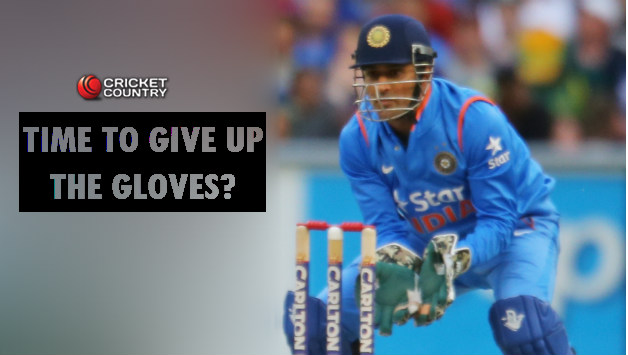MS Dhoni should consider giving up wicketkeeping in order to extend ODI and T20I career
MS Dhoni should consider giving up wicketkeeping in order to extend ODI and T20I career

MS Dhoni made his international debut for India in 2004-05. He was made One-Day International (ODI) and Twenty20 Internationals (T20Is) captain in 2007, and took over as Test captain in 2008. Since then, he has performed the role of captain-wicketkeeper-batsman in all three formats of the game. He retired from Test cricket in 2014-15, having captained in 60 of the 90 Tests he played. Dhoni remains active in ODIs and T20Is, once again continuing his role as captain, wicketkeeper, and finishing batsman in the side. Perhaps no other cricketer in history has had to manage the workload Dhoni has had to bear. READ: MS Dhoni’s new role in India’s batting order against South Africa
Leading one of the most cricket-crazy nations is hard in itself, but doing so while also being the wicketkeeper and a leading batsman in the side is nothing short of mindboggling. Dhoni is one of only three men to keep wickets in over 400 international matches, the other two being Mark Boucher and Kumar Sangakkara. To add to that, Dhoni has also captained in 290 of these matches. He has batted in 296 innings across formats as wicketkeeper-captain, scoring over 10,000 runs at 47.91, with 11 centuries and 69 fifties.
A lesser man would have hung up his boots a couple of years ago, but Dhoni is no mere mortal. Much has been said and written regarding his cool mind and instinctive captaincy, but what is sometimes overlooked is his tremendous fitness. Rarely has Dhoni missed out on matches due to injury (barring the occasional bruised finger, which is an occupational hazard of being a wicketkeeper). He remains one of the quickest runners between the wickets in international cricket even now, and his stamina is nigh unending. READ: MS Dhoni vs Virat Kohli: Who should captain India against South Africa in ODIs?
And yet, despite his herculean vitality, Dhoni’s age finally seems to have caught up with him. He remains quick between the wickets, but his reflexes are not what they used to be behind the stumps. He was never one to dive for catches, but these days his default reaction is to let the fielder at slip attempt a catch that most wicketkeepers would still go for. The strain of keeping wickets while also captaining and batting at the crucial No. 6 position seems to be getting to him.
Dhoni could consider giving up the gloves in order to extend his career. Alec Stewart, Kumar Sangakkara, and Brendon McCullum all gave up the gloves at some point in their respective careers, and the impact on their batting was palpable. Sangakkara’s Test average sky-rocketed from the early 40s to the late 50s; while Stewart and McCullum did not enjoy rise quite as steep, they too started enjoying a more consistent run with the bat. READ: MS Dhoni: What makes him such a successful batsman?
Dhoni does not play Tests any more, but he could still stay on for a few years more in the shorter formats. India have no dearth of wicketkeeper-batsmen, be it the regular men like Wriddhiman Saha, Naman Ojha, Dinesh Karthik, Sanju Samson, and Parthiv Patel or the part-time options such as Robin Uthappa, KL Rahul, and Ambati Rayudu. He has already tried to move up the order, which seems like an excellent decision at present. If he gives up the gloves, he can play as a pure batsman and captain, thereby letting go of some of the pressure and possibly extending his career.
Dhoni seems to be evolving as a cricketer at this stage of his career. He could easily have a second coming as a frontline batsman, if he so wishes. Captaining and playing only two formats without having to keep wickets could help the Dhoni of old come to the fore. And who does not want to see the helicopter with much more regularity? READ: MS Dhoni: Top 10 innings in international cricket
(Shiamak Unwalla, a reporter with CricketCountry, is a self-confessed Sci-Fi geek who loves cricket more than cricketers. His Twitter handle is @ShiamakUnwalla)